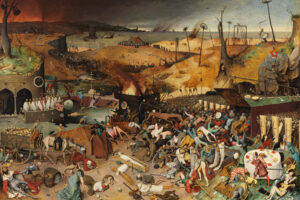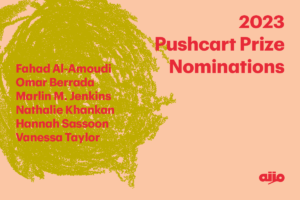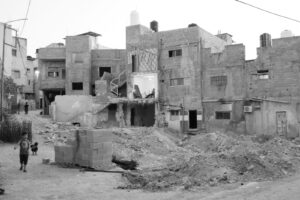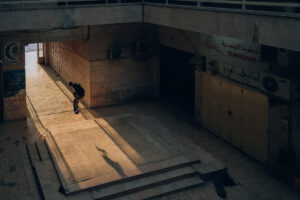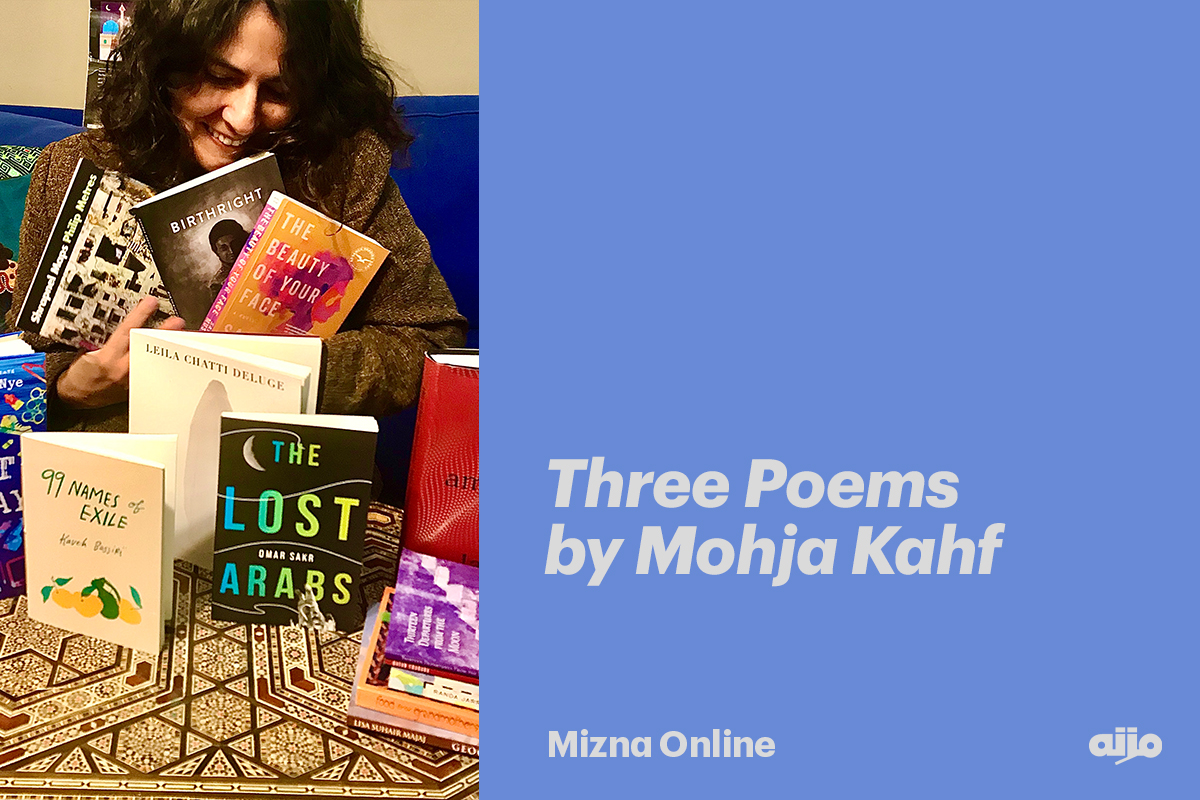
April 16, 2025
Three Poems by Mohja Kahf
In these three poems by academic and poet Mohja Kahf, Syria is written not only as the site of violent abduction and imprisonment, but also as a diverse country suffering from Arab and Sunni supremacy.
—Layla Faraj, editorial assistant
If you know anything, tell Maimouna
if you met someone who’s been in prison
and may have seen them, tell Maimouna
You can’t mourn; to mourn is to desert them.
They might still be alive, they are.
—Mohja Kahf, Tell Maimouna
Tell Maimouna
They weren’t on the list
They weren’t on the list of the dead,
the one released July 2018
of thirty-seven hundred prisoners killed
years before, without notice to their families.
Maimouna’s brothers were not on the list—
Iqbal and Suhaib, early twenties
when they were detained November, 2012
About yay tall. Thin. Thick brown-black hair.
Lifelong intentional nonviolence gives their faces
a certain innocence
If you know anything, tell Maimouna
if you met someone who’s been in prison
and may have seen them, tell Maimouna
You can’t mourn; to mourn is to desert them.
They might still be alive, they are.
Suhaib will need that notebook with the clasp
I’m saving for him. I’m stowing the Racine
volumes; Iqbal will need them when he starts teaching
French literature. Their place is saved.
Lives wide open. Unfinished.
You keep talking to them in your head,
bargaining against the gnaw,
against mass graves,
before the spinner in your brain
yields to sleep. You banish the thought. Banish it.
Meanwhile, another round of search.
Some bureaucrat may finally talk.
Some new prisoner released to ply for information.
The mind repeats, there could be explanations, there could.
Mazen spent seventeen years inside, and he came out.
It happens. It could happen. It’s only
been six years. Seven now. Nine. Twelve.
Searching. Grieving. Guilt for grieving.
Coping with guilt, and the cycle repeats,
a wound that won’t close. Mustn’t close.
Search with us. Hope for us
when we no longer dare to hope.
And tell Maimouna.
Bibúre
We Arab Syrians could learn a word or two in Kurdish
Say, “Sere Kaniye,” or “Mem ú Zin,” or “biji Kurdistan”
Kurdish Syrians already speak two tongues of endurance,
long ago decoded a regime
that fires on funerals and calls it “counter-terrorism,”
long ago learned the difference between a soccer match
and a march for rights on land their ancestors furrowed
Kurds already knew the difference between a protester and a terrorist
before it dawned on Arab Syrians getting shot for shouting “azadi”
at the only protest we dubbed with a Kurdish name
We could learn to say s’pas
We could learn to say bibúre
Hidebound in Diaspora
Slowly, you forget the stone church where your great-
grandmother murmured Aramaic blessings for the Virgin,
and you start to think all Syrians are like
the Sunni Arab ones at your Manchester mosque
In the Chicago Syrian doctor’s club,
Black Syrians too poor to emigrate slip from sight
Post-1965 the U.S. filtered you by class, welcomed
your light-skinned college-boy dad, but left behind
Kurdish farmers in Sere Kaniye—which
you think is only called Ras al-Ayn. You overlook
that Assyrians might feel out of place
among your exiled Ikhwanji neighbors
at your corporate compound in Riyad
Living in Mecca, how often do you face-
to-face Yezidi Syrians? You start to imagine
that Alawites have horns, forget
your teen crush on the coastal girl beach-bred
You no longer daily see ‘Uqqal of the Jabal
born and reborn. Your kids
and Syrian Turkmen kids
in diaspora keep separate kitchen-table languages
It slips your mind that Armenians are home in Syria too
Your grandkids mistake singer Omar Souleyman for “khaleeji”
but think Asala “looks Syrian”
Together, you watch Bab al-Hara over fajitas
from the Dallas superstore, and misremember
a Syria filled only with people like you

Mohja Kahf is a professor of comparative literature at the University of Arkansas since 1995 in the English Department and Program in Middle East Studies. Mohja, author of a novel and three poetry books, was exiled from Syria until 8 Dec 2024. Kahf is a member of the Syrian Women’s Political Movement, Radius of Arab American Writers, and Syrian Nonviolence Movement. Mohja serves on the board of Canopy NWA, a refugee resettlement agency in northwest Arkansas.





